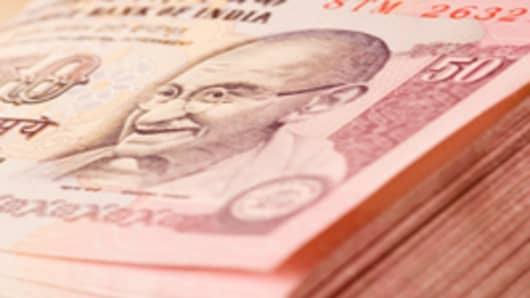Delhi-based communications consultant Sanjiv Kataria is not going to the U.S. this August to accompany his daughter as she starts a master's degree program at the University of Pennsylvania in Philadelphia.
The decision to break the normal practice among Indian parents – who tend to escort their children in overseas enrolment – was not an easy one for the 56-year-old, who says it was a choice driven purely by economics: a falling rupee , that has depreciated about 25 percent over the past one year, coupled with red hot inflation at home and skyrocketing airfares.
Kataria, who has been holidaying abroad every year since the past six years, says the plummeting rupee has messed up his budget. “All my calculations with regard to her education costs and the cost of a return trip to the U.S. were based on rupee at 50 against the dollar, now it’s almost at 57. We have to send her to college, but can save on our trip,” he told CNBC.
Last year 13 million Indians traveled abroad on business and leisure, an increase of 10 percent over the previous year, according to data from market research firm Euromonitor International. But Ina Dawer, Research Analyst at the firm expects these numbers to be more “subdued” this year.
“Over the past six months travel costs have gone up by around 30-40 percent. The falling rupee is definitely resulting in a slowdown in foreign trips and spending when abroad amongst Indians,” Dawer said.
While business travel may not be as affected, middle class Indians, who have enjoyed the fruits of an economic boom that has seen the country grow above 9 percent for several years, are now feeling the pinch as the economy slows dramatically, bringing with it uncertainty about the future and accompanied by high cost of living.
One of the casualties of this downbeat mood is foreign travel. According to Prateek Chawla, who has been in the travel business for 26 years, Indians have scaled back on foreign holidays this year in a big way.
He says airfares have gone up by almost 50 percent to some U.S. cities because of a drop in seat capacity owing to a recent strike at national carrier Air India and the discontinuation of all international flights by ailing airline Kingfisher.
“Fifteen to 20 percent of those who would have liked to go abroad this summer are now heading for local hill resorts as the rupee has tanked against the dollar and euro and fares are now unaffordable,” Chawla told CNBC.
His Delhi-based travel agency Outbound Travels has seen a 25 percent drop in volumes so far this year compared to 2011. Chawla, who was also planning a trip to Spain and Morocco this summer with family, canceled because it was going “way beyond budget.”
The 44-year-old Bangalore resident, who went to Spain in June, said the holiday turned out to be very expensive. “We were expecting Spain to be very cheap given the European debt crisis, but we did not find it cheap because the rupee has depreciated so much that any advantage was neutralized.” The rupee has fallen about 10 percent versus the euro over the past one year.
Chawla adds that many of his clients have scaled back from going to the U.S. and Europe and are instead talking Southeast Asia, Sri Lanka and even China. “I have clients who were planning a trip to the U.S. but are now in Thailand instead.”
by CNBC's Gauri Bhatia



